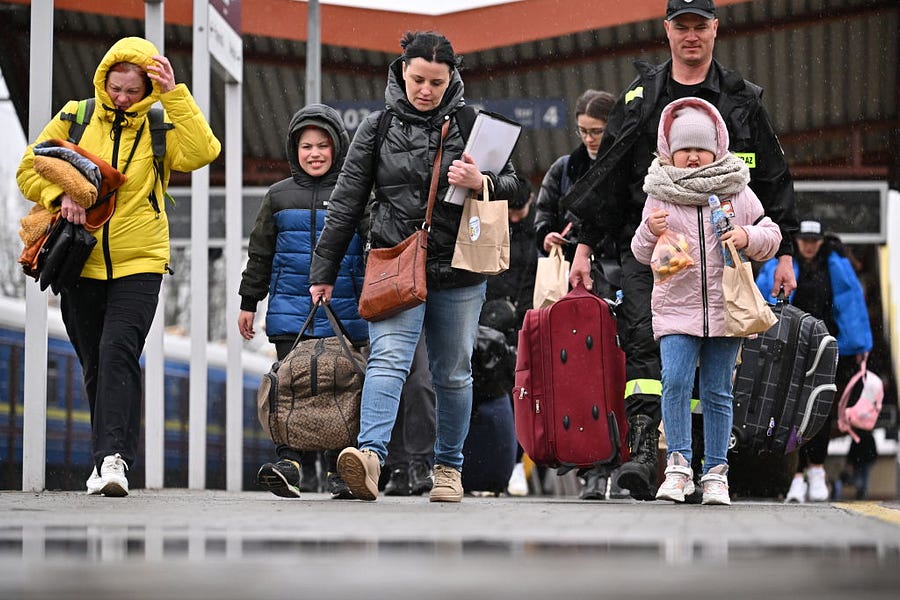Vladimir Putin’s hybrid war in Ukraine has created a multifaceted humanitarian crisis that the Kremlin plans to weaponize against the West to further provoke instability and chaos. Refugees have poured out of Ukraine since his February 24 invasion, and Russia’s attacks on Ukraine’s agricultural sector—from grain-export blockades to theft to strikes on agricultural facilities—are creating disruptions to the global food supply that are likely to create even more refugees worldwide. Foreign Minister Sergei Lavrov is touring Africa this week, blaming the West for the food crisis. Western leaders must realize the full destabilizing potential of Russia’s weaponization of the refugee crisis. In response, the United States should combine conventional military support with multilateral information operations to counter Russia’s plans.
We know Putin’s playbook well. After Putin’s 2014 invasion of Ukraine, 1 million Ukrainians took refuge in Poland. Putin’s 2015 intervention in Syria pushed 1.4 million refugees into the European Union. While the effects of refugee crises are not as apparent as other wartime security threats, these refugee surges exacerbated and caused other social crises, which then contributed to the rise of the far right across Europe.
As Western leaders have delayed a response to the refugee crisis, the Kremlin has built on its successes. While refugee rates from Putin’s conflicts in 2014 and 2015 were 1 million per year, Putin’s current war in Ukraine has already displaced 13 million Ukrainians. The Kremlin has engaged in tactics like missile terrorism, where troops launch missiles at Ukrainian towns to sow terror and push more refugees west. While the West continues to debate whether Putin would consider fighter jets for Ukrainian defense an escalation, Ukraine is running out of fighter jets and its missile defense system is insufficient to protect civilians.
Ratcheting up its missile terrorism is only one way that the Kremlin could intensify the refugee flow to the West. The Kremlin could also open a second front in Ukraine’s western regions by invading Lviv from Belarus, which would push up to 10 million Ukrainians toward the European Union. This crisis would be especially acute because millions from Ukraine’s east have sought safe haven in the country’s west, and Poland and Slovakia next door have already taken in all the refugees they can handle.
Putin’s war has also increased the potential for influxes of refugees into Europe from Africa. Putin has implemented grain blockades, stolen grain, and targeted agricultural facilities to attack the global food supply. Ukraine is known as the “breadbasket” of Europe, with Russia and Ukraine exporting a third of global wheat supplies. While rising food prices have impacted the whole world, countries in Africa are being hit the hardest. With countries like Tunisia, Somalia, Libya, and Eritrea importing almost half of their wheat from Ukraine, many of the Food and Agriculture Organization’s projected 47 million people who will experience “acute food insecurity” from the war will be in Africa. Nothing suggests that the Kremlin will stop. A deal to lift Russia’s Black Sea blockade took months to negotiate. The morning after agreeing to the deal Moscow struck Odesa’s port, the very place from which Ukrainian grain is transported to Africa and the Middle East. As of Wednesday, 80 ships are ready to leave Ukrainian ports but have been unable. Further, finding workers willing to serve on the crews of these ships is proving a challenge.
As Russia provokes this food crisis, it has been spreading disinformation in Africa to redirect resentment toward the West. In May, Russian U.N. Ambassador Vasiliy Nebenzya asserted that Europe was “hoarding” grain to use in “grain for weapons” exchanges with Ukraine. Within Africa, Russia’s embassies in Egypt and Zimbabwe reported that “illegal unilateral sanctions” and “Western interference” were to blame.
Many Africans will likely attempt to migrate to Europe and “generate instability in the EU,” according to Yale history professor Timothy Snyder. Placing the blame on the West in this way creates the potential for extreme resentment towards the West and adds to the already existing risk of instability and conflict in Western Europe.
With Russia causing two migration crises—one by bloodshed in the east and the other by famine in the south—the United States must act now. In Ukraine, Washington must deliver the military capabilities needed to stop the Kremlin’s missile terrorism, such as fighter jets and air defense systems. In Africa, the U.S. must counter Russian disinformation campaigns. While a recent State Department report on “the Global Food Crisis” is a good starting point to spread awareness, the U.S. should also, with the help of likeminded democracies, wage an information campaign on social media platforms. Content should include short social media videos, “myth vs. fact” analyses, and other information related to the food crisis to debunk Russian disinformation campaigns. The U.S. and others should also conduct preemptive information campaigns in Europe to warn audiences about Moscow’s plans.
The refugee crises caused by Putin’s war in Ukraine pose a serious threat to the domestic stability of countries in the EU. The U.S. must rally its European partners and respond as a united front with military aid and information campaigns before it is too late.
Ivana Stradner is an adviser to the Barish Center for Media Integrity at the Foundation of Defense of Democracies, where her research focuses on Russia and information operations. Iulia Sabina-Joja teaches at Georgetown and George Washington University, runs the Middle East Institute’s Black Sea program in Washington, D.C., and is co-host of the AEI podcast “Eastern Front.”






Please note that we at The Dispatch hold ourselves, our work, and our commenters to a higher standard than other places on the internet. We welcome comments that foster genuine debate or discussion—including comments critical of us or our work—but responses that include ad hominem attacks on fellow Dispatch members or are intended to stoke fear and anger may be moderated.
With your membership, you only have the ability to comment on The Morning Dispatch articles. Consider upgrading to join the conversation everywhere.